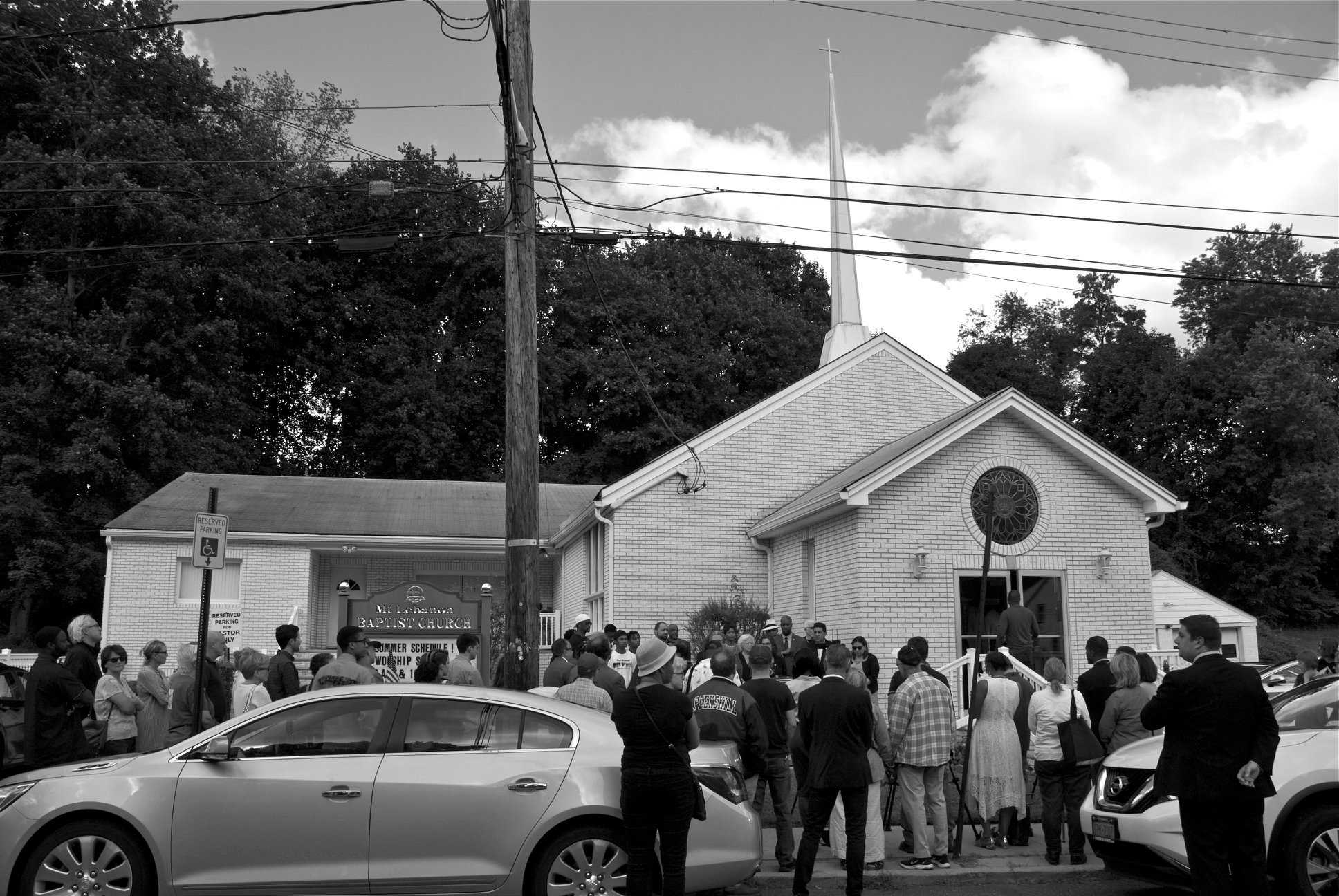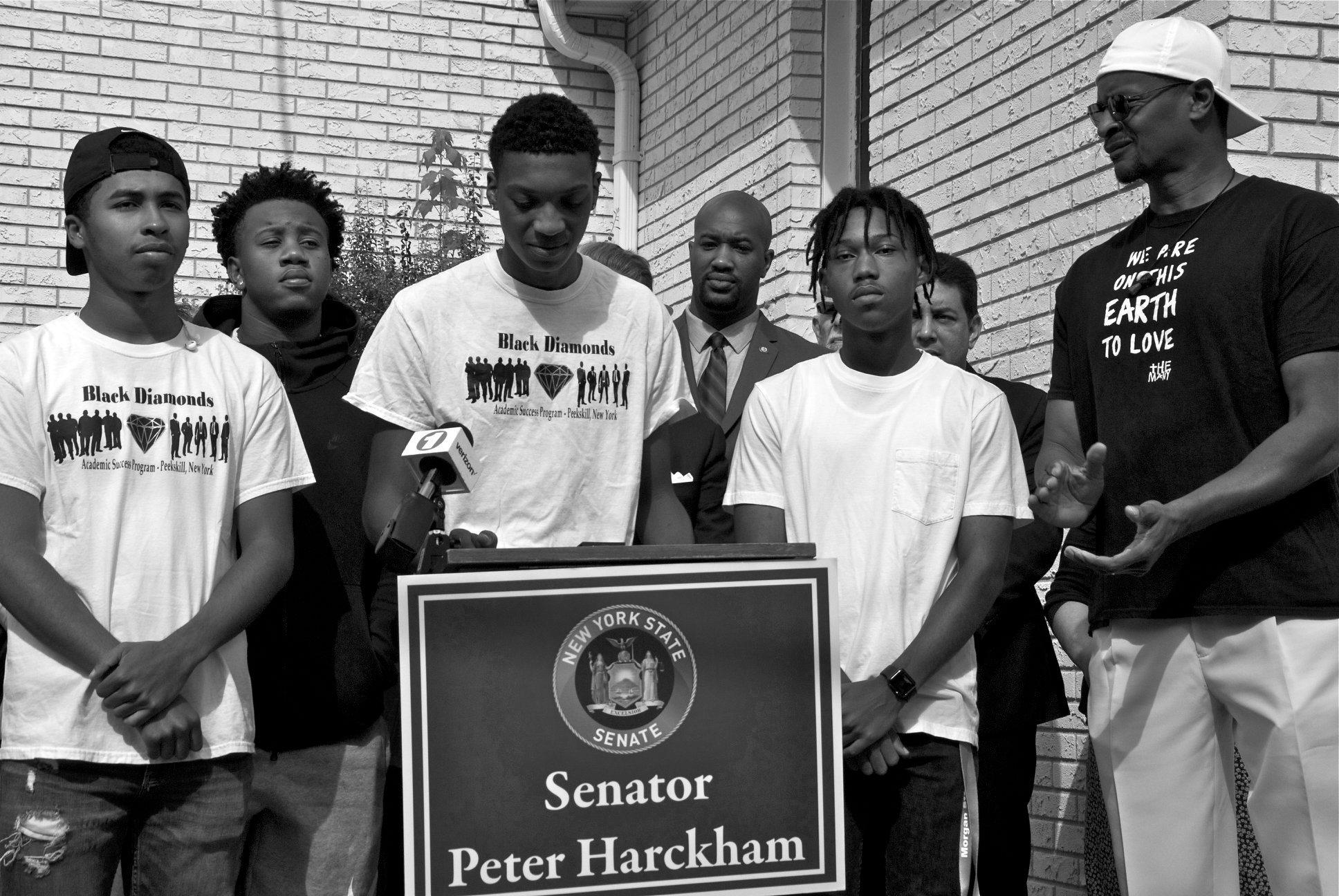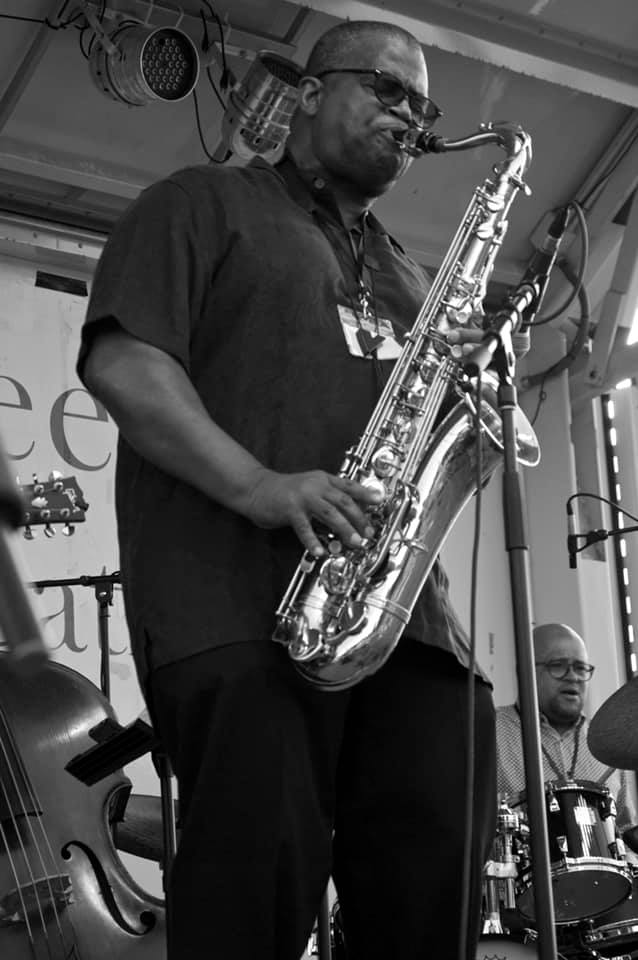The 50 people crowding the sidewalk on a Sunday morning in front of a small church on a residential street weren’t there for the services. They gathered to hear a message that is  usually reserved for inside a house of worship. And the preaching came from politicians who were talking about tolerance, love of neighbor and acceptance of differences.
usually reserved for inside a house of worship. And the preaching came from politicians who were talking about tolerance, love of neighbor and acceptance of differences.
The press conference at Mt. Lebanon Baptist church, arranged by state senator Pete Harkham’s office in conjunction with Mayor Andre Rainey, was in response to an incident in Peekskill that saw an offensive sticker smacked over a Peekskill Pride logo on the window of a business last Thursday.  Police received a call from The Rift Collectibles, a comic book store on South Street, about the anti-immigration sticker posted on their window. Police Chief Don Halmey said the incident is being investigated.
Police received a call from The Rift Collectibles, a comic book store on South Street, about the anti-immigration sticker posted on their window. Police Chief Don Halmey said the incident is being investigated.
In addition to state and local politicians, members of the various communities that make up Peekskill spoke. The mayors of Ossining and Croton told of the struggles their communities face in regard to racist flyers and actions. What was surprising was the absence of representaives from Peekskill Pride, Peekskill police and local businesses addressing the crowd.
Peekskill’s diversity was lauded and evidenced by members of the NAACP’s Black Diamonds youth group.

The diversity being touted was apparent a few hours after the 40-minute press conference ended. People of many different backgrounds were peacefully gathered at the Riverfront on a gorgeous Sunday afternoon listening to a free jazz concert, arranged by Peekskill’s Ray Blue, who is an internationally known musician.

A common theme at the press conference was the idea that hate has no home here. That phrase has become the motto emblazoned on yard signs that are frequently seen in this area. But instead of emphasizing the negative, wouldn’t it be better to highlight the affirmative, Love Lives Here?
What does it look like for Love to Live Here? In the 4.3 square miles that is Peekskill, bounded on one side by the river, we don’t have huge open spaces, we live close to each other. We get to rub shoulders with each other. We are not isolated. How could we strengthen our bonds to each other here in this small city that is a microcosm of the world? What if we were to pay attention to the suffering of people who are different from us? How would we go about that? Perhaps getting to know in a deeper way those who we casually walk past. There are many opportunities to engage with others here. Being capable of paying attention to the struggles of others has a whole lot to do with what community we belong to and whose consciousness and life experiences impact our own on a daily basis says Helen Prejean in her new memoir, River of Fire. She’s the author of Dead Man Walking (her story of befriending death row inmates) and knows something about being around people who are different from herself.
It’s the fear of those who are different from us; who eat food we’ve never tasted, listen to music we’re unfamiliar with, speak a language we don’t understand that drives division and hatred. Human evolution has programed us for either fight or flight when we’re fearful. But there is a third way, a way between passivity and violence. It’s the third way, the way of love, that the Rev. Martin Luther King wrote about from a Montgomery jail during the bus boycott. He delivered these words at a sermon at Dexter Avenue Baptist Church in Montgomery, Alabama on Christmas 62 years ago.
“To our most bitter opponents we say: We shall match your capacity to inflict suffering by our capacity to endure suffering. We shall meet your physical force with soul force. Do to us what you will, and we shall continue to love you. We cannot in all good conscience obey your unjust laws, because noncooperation with evil is as much a moral obligation as is cooperation with good. Throw us in jail, and we shall still love you. Bomb our homes and threaten our children, and we shall still love you. Send your hooded perpetrators of violence into our communities at the midnight hour and beat us and leave us half dead, and we shall still love you. But be ye assured that we will wear you down by our capacity to suffer. One day we shall win freedom, but not only for ourselves. We shall so appeal to your heart and conscience that we shall win you in the process, and our victory will be a double victory.”
The love he speaks of isn’t achieved without great cost but it offers a way to break the cycle of violence that we find ourselves caught up in as we face the reality of divisions that exist among us.
Some 12 years after King wrote those words, a voice from a different generation summed it up when he said “ When the power of love overcomes the love of power, there will be peace.” Jimi Hendrix knew what the power of love could do.


